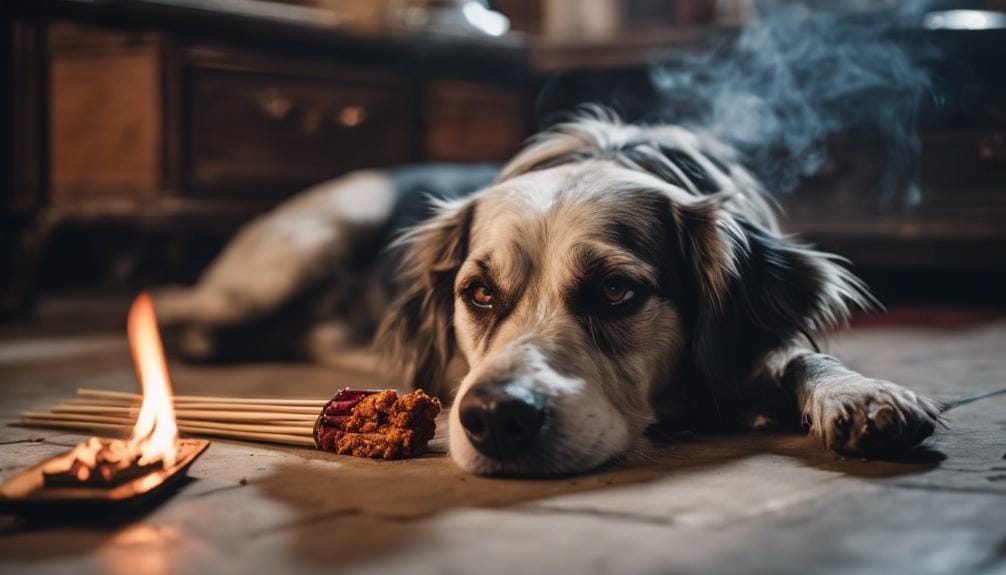Are Incense Bad for Dogs? Understanding Potential Risks and Effects
If you’re pondering whether incense is perilous for your pooch, ponder no more. The potential pitfalls of incense for dogs are worth understanding. So, is incense bad for dogs?
Their delicate respiratory systems and keen sense of smell make them susceptible to adverse effects.
Stay tuned to uncover the risks, signs, and precautions to safeguard your furry friend’s well-being.
Key Takeaways
- Incense can harm dogs’ respiratory systems and cause allergies and skin issues.
- Certain breeds are more vulnerable to incense risks due to their anatomy.
- Symptoms of incense poisoning in dogs include vomiting, diarrhea, and respiratory distress.
- Prevention involves proper ventilation, recognizing harmful types, and seeking immediate veterinary care.
Understanding Incense Risks for Dogs
Beware of the potential risks incense poses to your furry companions, particularly their sensitive respiratory systems. When burning incense around dogs, you must be aware of the health risks it can present, especially concerning incense and dogs. The smoke emitted from incense can lead to respiratory issues, allergies, and skin irritation in your beloved pets. Dogs, with their heightened sense of smell, are even more susceptible to the adverse effects of incense exposure.
Certain breeds, especially those with flat faces like pugs and bulldogs, are at a higher risk of smoke inhalation due to their anatomy. The symptoms of respiratory distress, asthma, and skin allergies can manifest in dogs that have been exposed to incense smoke. To ensure the safety of your canine companions, it’s crucial to take appropriate safety precautions when using incense in your home.
Proper ventilation is key to minimizing the risks associated with incense burning around dogs. Ensure that there’s adequate airflow in the space where you light incense to prevent the accumulation of harmful smoke. Additionally, closely monitor your dogs for any signs of discomfort or health issues when incense is being used. By being vigilant and taking necessary precautions, you can create a safer environment for both you and your furry friends.
Potential Dangers of Incense Exposure

When considering the health and well-being of your canine companions, it’s crucial to recognize the potential dangers that incense exposure can pose to them. Here are four key risks to be aware of:
- Respiratory Problems: Inhaling incense smoke can irritate your dogs’ sensitive respiratory systems, potentially leading to respiratory issues like asthma or difficulty breathing.
- Skin Irritation: Incense may contain substances that can trigger skin irritation and allergies in certain breeds, especially those with sensitive respiratory systems like brachycephalic breeds.
- Fire Hazard: Burning incense around pets poses a fire hazard, emphasizing the importance of cautious and responsible use to prevent accidents and injuries.
- Air Pollution: The smoke emitted by incense can contribute to air pollution in your home, affecting not only your dogs but also other family members. This pollution can exacerbate existing respiratory conditions and cause discomfort for your pets.
Understanding these risks associated with incense exposure is vital in safeguarding the well-being of your furry friends. By being mindful of these potential dangers, you can create a safer environment for your dogs and ensure they live healthy, happy lives free from unnecessary respiratory irritants and hazards.
Symptoms of Incense Poisoning in Dogs

Incense poisoning in dogs can manifest through various symptoms, ranging from vomiting and diarrhea to respiratory distress and skin irritation. If your dog has been exposed to incense and starts showing signs of vomiting or diarrhea, it may be a sign of incense poisoning. Keep a close eye on your furry friend for any abdominal pain or discomfort as well.
Additionally, watch out for respiratory symptoms such as coughing, difficulty breathing, or wheezing. These signs could indicate that your dog is experiencing respiratory distress due to exposure to incense. Skin irritation and allergies are also common symptoms of incense poisoning in dogs, so pay attention if you notice your dog scratching excessively or developing rashes.
Moreover, if your dog exhibits symptoms like nausea, dizziness, or eye irritation after being around incense, it could be a result of incense poisoning. In severe cases where ingestion has occurred, be vigilant for seizures, further respiratory distress, and potentially fatal outcomes. It’s crucial to seek immediate veterinary attention if you suspect your dog has been poisoned by is incense toxic to dogs to ensure proper diagnosis and treatment. Your furry companion’s health and well-being should always be a top priority.
Identifying Harmful Incense Types for Dogs

Certain types of incense can pose significant health risks to your furry companion, so it’s crucial to be aware of the harmful varieties that could adversely affect your dog.
- Frankincense: This type of incense can lead to gastrointestinal upset in dogs, causing symptoms like vomiting and diarrhea. It’s essential to keep this incense out of reach of your dog to prevent digestive issues.
- Myrrh: Myrrh can result in skin, eye, and respiratory irritation in dogs. If your dog comes into contact with myrrh incense, they may experience discomfort and itchiness on their skin, eyes, or respiratory tract.
- Sandalwood: Sandalwood is toxic to dogs and can have severe effects such as vomiting, diarrhea, and difficulty breathing. Immediate veterinary attention is crucial if your dog ingests or inhales sandalwood incense.
- Patchouli: Patchouli incense can cause a range of problems for dogs, including skin irritation, respiratory issues, and digestive problems. If you notice your dog experiencing symptoms like coughing, sneezing, or digestive upset after exposure to patchouli, consult your veterinarian promptly.
Being mindful of these harmful incense types can help you protect your canine companion from potential health hazards. If you suspect your dog has been affected by any of these incenses, seek veterinary care promptly to ensure their well-being.
Treatment and Prevention for Incense Toxicity

To safeguard your beloved canine companion from the potential dangers of incense toxicity, understanding the necessary treatments and preventive measures is paramount for their well-being. When dealing with incense toxicity in dogs, quick and appropriate treatment is crucial to minimize harm. Here are some common treatment options for incense toxicity in dogs:
| Treatment | Description | Benefits |
|---|---|---|
| Inducing Vomiting | Helps remove incense from the stomach to prevent further absorption of toxins. | Prevents toxins from being fully absorbed |
| Activated Charcoal | Absorbs remaining toxins in the dog’s system to reduce their effects. | Reduces the impact of toxins on the body |
| Oxygen Therapy | Essential for dogs experiencing breathing issues due to incense poisoning. | Improves oxygen levels in the bloodstream |
| Fluid Therapy | Helps flush out toxins from the body and maintain hydration levels in exposed dogs. | Assists in eliminating toxins and preventing dehydration |
In addition to these treatments, prescribed medications may also be necessary depending on the severity of the poisoning. Prevention is key in avoiding incense toxicity in dogs. Always keep incense out of reach of pets, ensure good ventilation when using incense, and be cautious with burning different types of incense around your furry friend. By being proactive and informed, you can help protect your dog from the potential risks associated with incense exposure.
Frequently Asked Questions
Does Incense Affect Dogs?
Incense can significantly impact dogs. Their sensitive respiratory systems are vulnerable to the smoke, leading to breathing issues and allergies. Certain breeds, like brachycephalic ones, are at higher risk. Protect your furry friend by avoiding incense exposure.
What Is the Danger of Burning Incense?
Breathing in incense smoke can harm your furry friend. It releases harmful particles and toxic gases like carbon monoxide, causing respiratory issues and skin allergies. Protect your pup by avoiding burning incense near them.
Are Incense Sticks Toxic?
Yes, incense sticks can be toxic. When burned, they release harmful particles and gases that can irritate your dog’s respiratory system and skin. Some incense may even contain toxic ingredients, posing ingestion risks. Be cautious.
Is There Non Toxic Incense?
Yes, there is non-toxic incense available. Look for labels like ‘non-toxic’ or ‘natural’ to ensure safety for your dog. These options are free from harmful chemicals, synthetic fragrances, and dyes, providing a safer choice for pet owners.
Conclusion
In conclusion, it’s crucial to be aware of the potential risks that incense can pose to our beloved canine companions. By understanding the dangers of incense exposure, recognizing symptoms of poisoning, and taking preventative measures, we can ensure the well-being of our furry friends.
Consulting a veterinarian and monitoring our dogs for any signs of discomfort when incense is burned is essential in keeping them safe and healthy. Let’s prioritize our pets’ health and make informed choices to protect them from harm.

